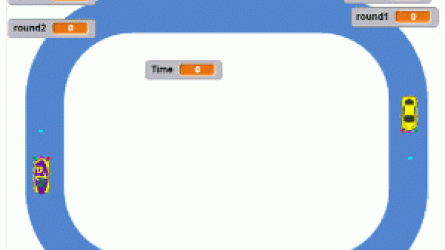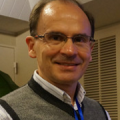
STEAM Education in the Schools of Euskadi: First Steps
Description
Validation of the Department of Education of the Basque Government for non-university teaching staff will be requested.
The aim of the course "STEAM Education in the Schools of Euskadi: First Steps" is to introduce the concept of STEAM Education in the community of teachers of Euskadi.
The course is aimed mainly at teachers of primary and secondary education in Euskadi, regardless of the specialization or course that they impart. In addition, the course is designed for all future teachers of primary and secondary education, and in general for students of education-related degrees.
The purpose of this course is to provide participants with a first experience with the STEAM Education (Science, Technology, Engineering, Arts and Mathematics) in the context of the Euskadi education system.
The course will be held on the online courses platform of the Summer Courses Foundation of the University of the Basque Country / Euskal Herriko Unibertsitatea (UPV / EHU). It is a learning platform based on Moodle.
The participant must complete a set of tasks related to the contents of the course, including works, multiple-choice questionnaires, and participate in the module forums.
The course guide is structured in the following sections: Learning Competences and Objectives, Contents, Methodology and Work Plan, Evaluation Activities, Calendar and Bibliography.
- 30 hours over 4 weeks. (Dedication 7-8 h / week)
- More 1 week for evaluation and closing of the course
Single price: 80 euros
Official language: Spanish-Spanish, Basque
Evaluation: the course has four modules o chapters; each module has two evaluated activities:
- Questionnaire: the questionnaires (10 multiple-choice questions) can be answered twice, and the best grade obtained will be taken. Each questionnaire is worth 12,5% of the final grade.
- Work or Task: comprehensive summary on the topic that describes the context and defines the main concepts that have been developed in the topic. Each job is worth 12.5% of the final grade.
Objectives
1.- Know the concept of STEAM Education.
The learning objectives are:
- Understanding STEAM Education
- Adapt teaching to the STEAM Education
- Cooperate to introduce STEAM in the classroom
2.- Learn how to successfully implement STEAM Education in the classroom.
The learning objectives are:
- Recognize the differences of traditional STEAM and computational STEAM
- Develop cross-disciplinary and disciplinary competences through the STEAM Education
- Show interest in the computational STEAM in the classroom
3.- Know how to prepare to be a teacher in STEAM Education.
The learning objectives are:
- Relate technological tools for the development of STEAM Education
- Compare training proposals in STEAM
- Strengthen the STEAM vision in society
4.- Use basic examples of STEAM Education with Scratch / Snap.
The learning objectives are:
- Understand Scratch / Snap programming environments for STEAM experiences
- Use the Scratch / Snap programming environments for STEAM experiences
- Be aware of the usefulness of Scratch / Snap programming environments for STEAM experiences in the classroom
Activity directed to
- University students
- Teachers
Program
30-09-2019 / 06-10-2019
Módulo 0.- Introducción al Curso
“ Introducción al Curso”
Este módulo presenta las líneas generales y la estructura del curso; se describirá la dinámica que se seguirá semana tras semana para lograr los objetivos de aprendizaje del curso, y se detallarán las actividades de evaluación del curso.
- Visión general del Curso
- Plataforma y metodología del curso
- Urtza Garay Ruiz
- Ainara Romero Andonegui
- Arantzatu López De la Serna
- Eneko Tejada Garitano
- Miguel Ángel Olabe Basogain
- Juan Carlos Olabe Basogain
- Xabier Basogain Olabe
30-09-2019 / 06-10-2019
Módulo 1.- Educación STEAM en el sistema educativo
Este módulo presenta el origen y concepto de STEAM, desde sus orígenes en los Estados Unidos en los años 1990 con el término STEM hasta la actual denominación STEAM y otras denominaciones derivadas. La necesidad de la sociedad de futuros profesionales en STEAM requiere que el sistema educativo adapte estas nuevas materias con una integración curricular y metodológica. ¿Cómo están afrontando los sistemas educativos este reto? En este contexto surge la necesidad de hablar de Educación STEAM en las escuelas y no simplemente de introducir la palabra STEAM en las escuelas.
- ¿Qué es STEAM?
- Sistema Educativo y STEAM
- Educación STEAM.
- Urtza Garay Ruiz
- Ainara Romero Andonegui
- Arantzatu López De la Serna
- Eneko Tejada Garitano
- Miguel Ángel Olabe Basogain
- Juan Carlos Olabe Basogain
- Xabier Basogain Olabe
07-10-2019 / 13-10-2019
Módulo 2.- Implementar con éxito la Educación STEAM en las aulas
Este módulo continua con el desarrollo del concepto de Educación STEAM. Se repasa los factores que han hecho que las iniciativas de STEAM algebraico hayan tenido poco éxito en las escuelas (bajo nº de alumnos interesados, brecha de género y brecha social). En este curso definimos STEAM computacional. La Educación STEAM computacional se basa en un currículo moderno, en el potencial de las capacidades cognitivas del alumno, y en el uso del ordenador como entorno de trabajo.
- STEAM algebraico
- STEAM computacional
- STEAM y competencias
- Urtza Garay Ruiz
- Ainara Romero Andonegui
- Arantzatu López De la Serna
- Eneko Tejada Garitano
- Miguel Ángel Olabe Basogain
- Juan Carlos Olabe Basogain
- Xabier Basogain Olabe
14-10-2019 / 20-10-2019
Módulo 3.- Cómo prepararnos para ser docentes en Educación STEAM
Este módulo 3 describe cómo afrontar este nuevo reto para los docentes, cómo prepararse para la Educación STEAM en el aula. Se muestran tres ámbitos para esta preparación: conocimiento de las herramientas tecnológicas para STEAM (destacando el uso del ordenador como entorno de trabajo), la formación STEAM en diferentes categorías formativas, y la visión de la cultura STEAM de la sociedad.
- Herramientas Tecnológicas para STEAM
- Formación STEAM
- Visión STEAM de la Sociedad
- Urtza Garay Ruiz
- Ainara Romero Andonegui
- Arantzatu López De la Serna
- Eneko Tejada Garitano
- Miguel Ángel Olabe Basogain
- Juan Carlos Olabe Basogain
- Xabier Basogain Olabe
21-10-2019 / 27-10-2019
Módulo 4.- Creando Experiencias para enseñar y aprender STEAM con Scratch
El módulo 4 titulado “Creando Experiencias para enseñar y aprender STEAM con Scratch” presenta la integración de los tres pilares del curso (currículo, capacidades cognitivas del alumno, y el ordenador como entorno de trabajo) a través de ejemplos sencillos utilizando el entorno online de programación Scratch. Se desarrollan cuatro experiencias básicas a través de proyectos Scratch sobre cuatro materias del currículo moderno, potenciando las capacidades cognitivas del alumno, y utilizando el ordenador con el lenguaje computacional Scratch.
- Scratch y Snap: entornos para Educación STEAM
- Experiencias: Cálculo diferencial, Cibernética computacional, Probabilidad computacional, Geometría vectorial diferencial
- Urtza Garay Ruiz
- Ainara Romero Andonegui
- Arantzatu López De la Serna
- Eneko Tejada Garitano
- Miguel Ángel Olabe Basogain
- Juan Carlos Olabe Basogain
- Xabier Basogain Olabe
Directors

Xabier Basogain Olabe
Universidad del País Vasco / Euskal Herriko Unibertsitatea, Subdirector de Relaciones con la Empresa
Full Professor of the University of the Basque Country - Euskal Herriko Unibertsitatea. Telecommunications Engineer from the Polytechnic University of Madrid, and Doctor of Telecommunication Engineering from the University of the Basque Country - Euskal Herriko Unibertsitatea. Member of the Systems Engineering and Automation Department of the School of Engineering of Vitoria-Gasteiz. He has taught courses in digital systems, microprocessors, digital control, systems engineering, modeling and simulation of discrete events, machine learning, and synchronous collaboration tools in education. His research activities include the areas of: a) soft computing and cognitive science for STEAM; b) learning and teaching technologies applied to online education; c) virtual and augmented reality with mobile technologies. ORCID ID: 0000-0002-6672-6897
Speakers
Urtza Garay Ruiz has a PhD from the University of the Basque Country and a postgraduate degree in Multilingual Education from the University of Barcelona. She is a professor and Director of Methodological Innovation at the University of the Basque Country-Euskal Herriko Unibertsitatea. He is also a member of the consolidated research group of the “Weblearner” on technology and education. He has participated in competitive research projects of the Ministry of Education and Science, the Basque Government and UPV / EHU. In addition to coordinating and participating in Teaching Innovation Projects and has published teaching material for Primary, Secondary and University Education. His lines of research are MOOCs, PLE, RA, Educational Technology and Multilingual Education. She has made contributions to various national and international conferences and has published chapters in books and articles in educational research journals of high international impact.

Arantzazu López de la Serna
UPV/EHU
Associate Professor of the University of the Basque Country - Euskal Herriko Unibertsitatea. Degree in Pedagogia from the University of Deusto.Degree in teaching from de University of Mondragon and Doctor from the University of the Basque Country - Euskal Herriko Unibertsitatea. Member of the Department of Didactics and School Organization. (UPV/EHU) He has taught courses in Innovation and technology, Prevention in education, Gender and technology. His research activities include the areas of: a) Educational innovation; b) Gender and technology; c) Prevention and risk reduction in educational contexts; d) MOOC and SPOOC courses. Place: Faculty of Education of Bilbao, UPV / EHU ORCID ID: 0000-0002-9297-8641

Juan Carlos Olabe Basogain
Juan Carlos Olabe is professor of Electrical and Computer Engineering at Christian Brothers University (CBU), in Memphis TN., USA. He holds a PhD in Telecommunications Engineering by the Polytechnic University of Madrid. He has taught courses in Electromagnetic Field Theory, Data Communications, Data Structures, and Data Base Design. His research activities include the areas of: a) computer network design; b) digital design; c) computational thinking and cognitive processes; and d) learning and teaching technologies applied to online education.

Miguel Ángel Olabe Basogain
Professor at the University of the Basque Country - Euskal Herriko Unibertsitatea. Doctor Industrial Engineer from the University of the Basque Country, and member of the Communications Engineering Department of the School of Engineering of Bilbao. He has taught courses in computer architecture, programming, modeling and simulation of networks, multimedia services, and creation and distribution of multimedia content in education. His research activities include the areas of: a) Soft Computing and cognitive science for STEM; and b) learning and teaching technologies applied to online education. Place: School of Engineering of Bilbao, EHU Office: 3A19 Telephone: 34 946014211 E-mail: miguelangel.olabe@ehu.eus

Ainara Romero Andonegui
Euskal Herriko Unibertsitatea, UPV/EHU
Associate Professor of the University of the Basque Country - Euskal Herriko Unibertsitatea. Degree in Psychology from the University of Deusto and Doctor in Education from the University of the Basque Country - Euskal Herriko Unibertsitatea. Member of the Department of Didactics and School Organization. She has taught courses in digital competence, educational technology and active methodologies. Her research activities include the areas of: a) Learning and Knowledge Technologies b) Personal Learning Enviroment c) Massive Open Online Course eta d) Oral and written language acquisition. Place: Faculty of Education of Bilbao, UPV / EHU ORCID ID: https://orcid.org/0000-0002-0132-9508

Eneko Tejada Garitano
Associate Professor of the University of the Basque Country - Euskal Herriko Unibertsitatea. Degree in Psychopedagogy from the University of Deusto and Doctor from the University of the Basque Country - Euskal Herriko Unibertsitatea. Member of the Department of Didactics and School Organization. He has taught courses in digital competence, educational technology and active methodologies. His research activities include the areas of: a) long life learning; b) Creation of personal learning environments; c) virtual and augmented reality with mobile technologies; d) creation of Massive Open Online Course. Place: Faculty of Education of Bilbao, UPV / EHU ORCID ID: 0000-0002-6013-222X
Registration fees
| Registration | Until 02-10-2019 |
|---|---|
| 80,00 EUR |





